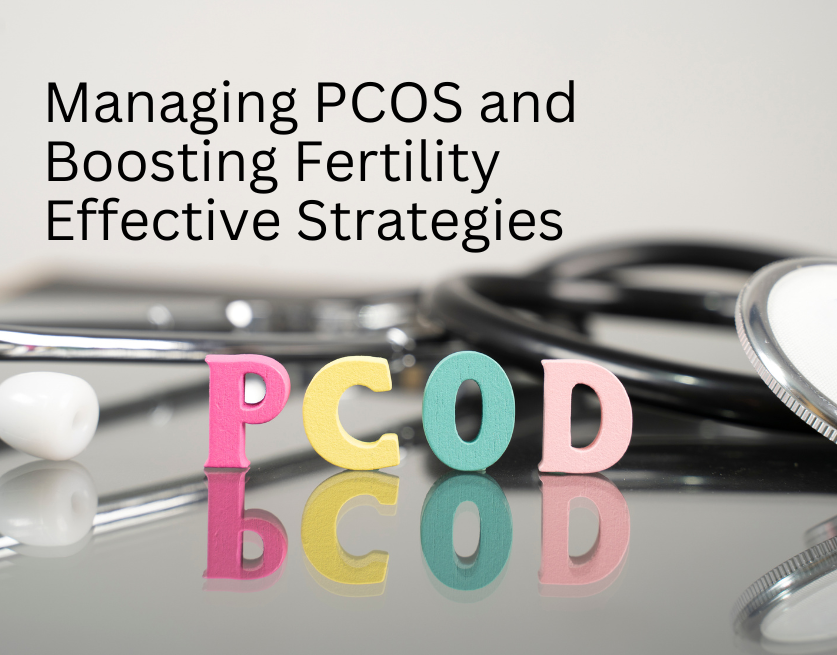
A common hormonal disorder found in women is polycystic ovary syndrome or otherwise known as PCOS. PCOS is distinguished by irregular menstrual cycles, overproduction of androgens, and small cysts on the ovaries; it can severely compromise a woman’s wellbeing and ability to conceive. You should seek an early diagnosis and effective treatment of the condition in order to enhance your health status.
Understanding PCOS/PCOD
This is a chronic condition which has different features in different women. Common signs and symptoms include:
- Irregular or missed periods: This is the earliest of any features of PCOS, as the woman might not ovulate at all or only occasionally.
- Excess facial and body hair (hirsutism): This is because the level of androgen is increased.
- Acne: This is because acne is characterized by an increase in the production of androgen hormones which when abundant causes more acne.
- Weight gain: It was also discovered that women living with this disease have a lot of problems when it comes to weight loss.
- Thinning hair or hair loss: This is also very widespread caused by changes in hormonal background of a woman’s organism.
- Skin darkening (acanthosis nigricans): build up of pigment especially in areas like the neck and the armpits or other parts of the body that have skin folds.
- Mood swings and depression: This is an indication that hormonal changes can impact on ones emotions.
- Difficulty getting pregnant (infertility): Hormonal imbalance resulting to irregular ovulation has been regarded as a major reason of infertility in women with PCOS.
PCOS and Its Effects on Fertility
Another common issue that many women with PCOS struggle with is the inability to get pregnant Inability to conceive is one of the most concerning symptoms that affect women with the syndrome. Thus, chronic irregularities in the hormonal balance of women with PCOS interfere with ovulation, which makes it difficult to conceive. Nevertheless, it is significant to realize that not all the female PCOS sufferers experience difficulties to conceive.
PCOS and Other Related Diseases
Beyond fertility issues, PCOS can increase your risk of developing several health problems, including:
- Type 2 diabetes: The next metabolic alteration associated with insulin resistance and linked with type II diabetes is also a component of PCOS.
- Heart disease: The above facts show that women with PCOS are more likely to develop complications such as high blood pressure, high cholesterol and other characteristics related to heart disease.
- Sleep apnea: Unfortunately, this sleep disorder is more prevalent in women with PCOS chiefly resulting from factors such as obesity and hormonal fluctuations.
- Endometrial cancer: The PCOS causes irregularities in mensural cycles and thereby lead to greater tendencies of endometrial cancer.
- Metabolic syndrome: This is condition that is a grouping of other factors that put you at risk of experiencing a heart attack, stroke or type 2 diabetes.
The Importance of Early Detection
That is why early diagnosis and proper treatment of the condition can help avoid these consequences in patients with PCOS. It is recommended to go for regular checkups and always monitor your symptoms especially when you are a patient with diabetes.
Comprehensive PCOS/PCOD Screening at Qris Health
At Qris Health, we tear off the mist and provide you with all the necessary PCOD/PCOS test in Delhi for women. Our tests include:
- CBC Test: To evaluate a general condition of blood, as a medium for transport of oxygen and nutrients to body’s tissues.
- FSH (Follicle-Stimulating Hormone) Test: To determine the patient’s level of FSH or follicle stimulating hormone which encourages the maturation of ovarian follicles.
- LH (Luteinizing Hormone) Test: In this case the level of LH, a hormone that stimulates the release of eggs, needs to be determined.
- Prolactin Test: To test for prolactin a hormone that can disrupt the process of ovulation.
- Progesterone Test: To estimate the serum progesterone level which is a hormone in pregnancy.
- AMH (Anti-Müllerian Hormone) Test: In order to determine ovarian reserve.
- Testosterone Test: To evaluate concentration of androgen which is one of the hormonal imbalances registered in PCOS.
- HBA1C Test: To monitor the blood sugar level and probability of developing diabetes.
- Thyroid Test: To rule out thyroid problems because thyroid disorders may have similar symptoms to PCOS.
Managing PCOS: An Integrated View
PCOS treatment involves modifying one’s diet and exercise regime and medication; fertility treatments may also be employed.
Lifestyle Changes:
- Weight management: Losing a small amount of weight can also alleviate the conditions related to PCOS.
- Regular exercise: Ideally, 30 minutes, at least 5 times per week of moderate intensity physical activity should be performed.
- Healthy diet: Diet also plays a significant role in the management of persoci conditions like PCOS, the recommended diet should include; fruits, vegetables, whole grain, lean meat among others.
- Stress management: Exercise or practice relaxation techniques daily to lower stress.
Medications:
Your doctor may prescribe medications to:
- Regulate your menstrual cycle
- Manage insulin resistance
- Reduce excess androgen levels
- Treat acne
- Manage mood symptoms
Fertility Treatments:
If you're struggling to conceive, your doctor may recommend fertility treatments like:
- Ovulation induction: The other is causing ovulation to occur with the use of medications.
- Intrauterine insemination (IUI): IUI or intrauterine insemination, which entails delivery of sperm right to the uterus.
- In Vitro Fertilization (IVF): IUI, fertilizing eggs with sperm in a laboratory before putting the embryo to the uterus of the woman.
Conclusion
It is rather persuasive that PCOS is not an easy condition to live with, yet, it is not impossible to manage and improve the quality of one’s health. It is essential to diagnose it at an early stage and receive proper treatment in order to enhance the quality of your further life and rise the probability of having child.
Qris Health is going to continue the services especially to the women with PCOD/PCOS test in Delhi. It is noteworthy that our healthcare organization provides a detailed diagnosing of PCOS/PCOD in Delhi and a comprehensive program of treatment for this disease taking into consideration each person’s individual characteristics. It is encouraged to consult the healthcare professionals for more assistance and getting more information.




